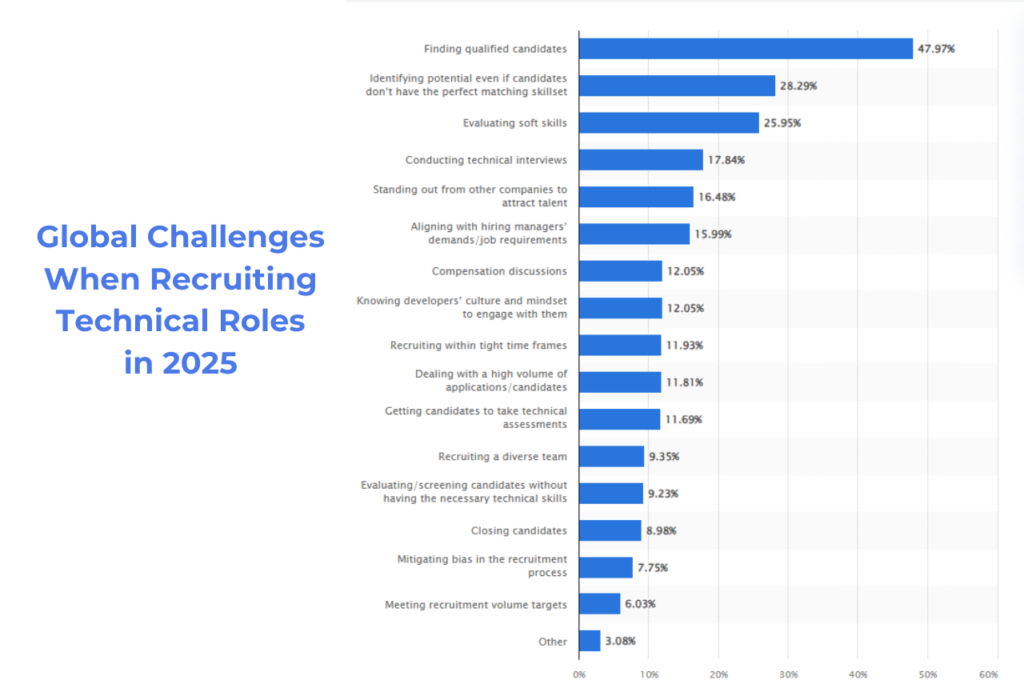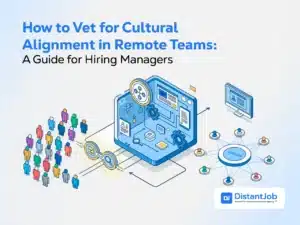Wondering what sets a technical recruiter apart from a regular recruiter? You’re not alone, this distinction confuses many job seekers and employers alike, but understanding it could be the key to your next career move or successful hire.
Technical recruiters are specialized talent acquisition professionals who focus exclusively on tech roles, possessing deep industry knowledge that enables them to identify, attract, and evaluate candidates for software engineering, cybersecurity, data science, and other technical positions. Unlike general recruiters who cast a wide net across industries, technical recruiters speak your language, whether that’s discussing API integrations, cloud architecture, or the latest programming frameworks.
This specialization matters more than you might think. After all, when you think about the fact that 70% of the global workforce actually consists of passive talent—people who aren’t actively looking for new jobs—and only 30% are searching, it becomes crystal clear that just posting job ads doesn’t cut it anymore.
And to help you with that, in this article, we’ll cover:
- What is a General (HR) Recruiter?
- What is a Technical Recruiter?
- Recruiter vs. Tech Recruiter: Key Differences & Similarities
- Choosing Between a Recruiter and a Technical Recruiter
Let’s get started by defining the role of a general recruiter.
What is a General (HR) Recruiter?
A recruiter, who’s also referred to as a general or an HR recruiter, is the professional who deals with the recruitment and hiring of a wide range of non-specialized roles and jobs across multiple departments and various industries.
Since they can provide talent to departments such as marketing, administrative, customer service, etc., their approach benefits companies that are scaling different teams at once and/or filling high-volume positions that need consistent culture-fit and compliance checks.
Core Responsibilities
Sourcing large candidate pools
Since they’re not focused on just one industry or role, they conduct high-volume outreach to fill their spots, which makes their candidate pools large and wide. To connect with possible candidates, they use job boards, referral networks, and social media.
Coordinating interviews & onboarding
Recruiters are responsible for scheduling meetings, managing paperwork for new hires, and helping them settle in.
Managing administrative and compliance tasks
They also run background and reference checks (with eight out of every ten recruiters saying they include reference checks in their screening process), ensure legal documentation is in order and correct, and follow companywide HR policies and rules.
Key Skills & Expertise
- Interpersonal & Communication Skills
- Adaptability & Flexibility
- Sales & Negotiation
- Organizational Abilities
- Market Insight
Roles Within the Organization
Agency or In-House Recruiters
They often work either in recruiting agencies or as part of in-house HR departments so they can handle diverse hiring needs.
Versatile Placement
They are able to recruit for positions and jobs in sales, marketing, administration, finance, operations, and more.
Broad Market Reach
Recruiters can and may serve multiple industries at the same time and provide them all with a wide candidate pool.
From experience, general recruiters tend to do well when it comes to high-volume hiring and they’re also experts at making strong first impressions.
However, if you’re trying to fill a top-level specialist position, they might not be the best pick for you, as you’ll definitely benefit more from working with someone who can truly “speak the candidate’s language”—and that’s where technical recruiters come in.
What is a Technical Recruiter?
Technical recruiters are hiring specialists who focus purely on tech jobs, hunting down candidates for software engineering, cybersecurity, data science, and other technical roles. They know the tech world inside and out, so they can actually tell if someone’s skills match what companies need and whether they’d be a good fit for the team.
These professionals manage and handle the end-to-end process of sourcing, screening, and connecting with candidates applying for roles that range from software development and DevOps to cybersecurity and data science, and more.
Tech recruiters ultimately combine their deep technical understanding and knowledge with their strong people skills to ensure they find and hire top IT talent and deliver them to the teams who need them.
And here are some interesting facts to know: in the US there are over 213,034 employed technical recruiters. And of all the tech recruiters, 48.8% are women while 51.2% are men, with an average age of 41 years old.
Core Responsibilities
In-Depth Job Analysis & Requirement Gathering
Technical recruiters work hand in hand with hiring managers when it comes to reviewing and improving job descriptions, ensuring every technical nuance—from specific programming languages to preferred frameworks—is clearly spelled out and can be clearly understood by applicants.
Sourcing & Candidate Identification
Since they’re more focused on specific talent, besides using platforms such as LinkedIn, they also use GitHub, Stack Overflow, as well as niche tech forums, and even social platforms like Twitter to find candidates who match the criteria they’re recruiting for.
Technical Screening & Assessments
These recruiters don’t stop at basic and standard HR questions. In order to assess their applicants’ practical skills and their ability to solve technical problems, they present them with coding challenges and role-specific tests, besides reviewing their portfolios. And this is a very important skill to have, as recent data shows that finding qualified candidates is actually the top global challenge, with a score of 47.9%, when it comes to recruiting technical roles in 2025.

High-Touch Candidate Engagement
They act as the main contact for candidates, meaning they are the ones who explain aspects of the role, pay, and benefits in detail. To do so, they need to be proactive in their follow-ups, hold open and transparent communication (which is extremely important, as 84% of candidates expect it), and they might even coach and guide their applicants on what to expect in interviews.
Process Management & Transparency
They’re also responsible for handling the entire interview process—from scheduling virtual or in-person interviews to negotiating offers—and ensuring that candidates are kept in the loop at each and every step.
Advisory Teamwork
Tech recruiters are the go-to expert and trusted advisor to hiring managers and teams, since they don’t only manage the recruitment process itself but also provide market insights, recommend competitive compensation strategies and plans, and make sure that the candidate’s tech skills match what the team actually needs.
Key Skills & Expertise
Technical Know-how
These recruitment professionals either have or grow a practical knowledge of technical terminologies and jargon, programming languages, and current tech stacks. This includes keeping up with new and emerging technologies and industry trends.
Analytical & Critical Thinking
When screening candidates, they are able to evaluate technical tests and portfolios with accuracy while asking insightful and smart questions to uncover how deep a candidate’s skills really go.
Relationship & Communication Skills
Since they act as a bridge between candidates and stakeholders, one of their key skills comes down to building and nurturing relationships with both of them. In the end, a successful technical recruiter possesses some soft skills which allows them to communicate clearly, follow up and through, and to build and establish trust—even during initial cold outreach.
Adaptability & Curiosity
Another way they shine is through the curiosity they show candidates and hiring managers as they continually and consistently ask them the right questions with the goal in mind of ensuring they find a perfect fit between both technical requirements and candidate capabilities and skills.
Professional Maturity
Tech recruiters are professionals who are also able to interact confidently with senior-level technical experts, since they have the maturity required to understand the high stakes and complexities involved in such technical roles. Besides, when having conversations with these IT pros, they don’t resort to using buzzwords or even pretending to know more than they actually do, as their own deep tech knowledge provides them with the fluency they need to hold these conversations.
Roles Within the Organization
Tech-Focused Recruitment Specialist
You’ll typically find them in tech companies, startups, or specialized IT recruitment and staffing agencies, as they are 77% more likely to work at private companies and not public ones.
Candidate Advocate
One thing that sets technical recruiters from other types of recruiters apart is the fact that they always make sure that their candidates have a positive experience. They do so by being transparent and open, thorough, and supportive from start to finish. This approach ultimately helps them to build long-term and lasting relationships and create a strong and robust talent pipeline.
And this matters a whole lot more than you probably think it does, and data can back it up:
- A study found that 50% of applicants have in fact rejected an offer because of a poor candidate experience during the hiring process.
- Up to 80% of candidates who have had a positive experience state that they have and will continue to share it with others, while 60% will share their negative ones.
- On the other hand, companies that have a strong candidate experience experience a 70% improvement in the quality of their new hires.
Developers, tech leaders, and engineers tend to respond more positively to and like recruiters who can actually have and hold meaningful and knowledgeable conversations about technology.
Ultimately, real technical recruiters combine their actual technical knowledge with a personal high-touch that not only assess hard skills but also builds trust and rapport.
So, if you need someone with deep subject expertise—especially when hiring remotely or in a competitive market—it’s essential that you partner with a tech recruiter who truly gets the ins and outs of IT hiring.
Recruiter vs. Technical Recruiter: Key Differences & Similarities
The main difference between recruiters and technical recruiters lies in specialization. Regular recruiters work across multiple industries and job types, while technical recruiters focus exclusively on technology roles and possess deep knowledge of programming languages, frameworks, and tech industry trends.
There are also very distinct contrasts in how each approaches the hiring process.
Key Differences include:
- Industry focus: General recruiters handle various sectors; technical recruiters specialize in tech only
- Skill assessment: Technical recruiters can evaluate coding abilities and technical competencies; general recruiters rely on resumes and basic interviews
- Sourcing methods: Technical recruiters use GitHub, Stack Overflow, and tech communities; general recruiters use traditional job boards
- Salary knowledge: Technical recruiters understand competitive tech compensation packages and equity structures
- Specialized Candidate Networks: For specific, niche tech experts, tech recruiters are the recruitment professionals who have strong ties and deep connections in the tech world,.
Similarities
- Core Functions:
- Both HR recruiters and technical recruiters are experts at sourcing, screening, interviewing, and negotiating.
- Relationship Building:
- They also both are great at establishing trust while building and maintaining long-term relationships with candidates.
- Use of Technology & Candidate Sourcing:
- These two types of recruiters both rely on ATS, social media, job boards, referrals, and recruitment marketing tools to find and connect with candidates.
- Negotiation & Employer Branding:
- Both of these professionals care about and care for the candidate’s first impression of your organization.
Tech Recruiters and HR Recruiters: Comparison Table
| General (HR) Recruiter | Technical Recruiter | |
| Scope of Roles | Broad, non-specialized | Niche IT/engineering positions |
| Skills/Expertise | HR compliance, culture fit | Coding stacks, tech trends, deeper remote logistics |
| Responsibilities | High-volume hiring, administrative tasks | Technical assessments, advanced sourcing |
| Industry Focus | Multiple sectors | Primarily tech-focused |
| Average Salary | $82,277/year | $126,944/year |
| Remote Hiring Expertise | General familiarity with off-site processes | Specialized in cross-border recruitment & virtual collaboration |
| Candidate Sourcing Channels | Job boards (Indeed, LinkedIn), local networking events, employee referrals | Developer communities (GitHub, Stack Overflow), tech job boards (AngelList, Dice), hackathons, tech meetups |
| Screening Methods | Behavioral interviews, cultural fit assessments | Coding challenges, technical interviews, skill tests |
| Networking & Relationship Building | Broad networks across various industries; high-volume focus | Deep, specialized tech community networks; quality & niche talent focus |
| Market Adaptability | Highly adaptable across sectors with varied staffing needs | Must continuously update on rapid tech trends and evolving technical skills |
| Strengths | – Versatile recruitment across multiple industries – Broad candidate networks – Efficient handling of high-volume hiring – Flexible approach to various role types | – Deep technical expertise and understanding – Specialized candidate sourcing – Tailored screening processes – Strong industry-specific networks |
| Weaknesses | – Limited technical insight for specialized IT/engineering roles – May rely on generic screening methods – Less effective for niche, highly technical positions | – Narrow focus limits versatility outside tech roles – Can overlook cultural or soft skill fit – Typically longer time-to-fill and higher fees due to specialization |
Choosing Between a Recruiter and a Technical Recruiter
The real question when choosing which recruiter to work with comes down to which one truly matches your specific hiring goals the best.
Consider these scenarios to help you make the best decision:
When General Recruiting is Your Best Choice
If you’re hiring for high-volume, entry-level, or non-specialized roles like customer support or sales, a general recruiter is generally the best choice for you and your business.
These recruiters are great at screening a large number of applicants quickly and efficiently, which makes them perfect for you if you find yourself needing to fill multiple positions across different departments.
So if your company is growing and scaling up fast and you’re expanding across various teams, a recruiter with a broad HR expertise is the best bet for you, as they can keep things organized and make sure every role gets the attention it needs.
In fact, a recent study found that 75% of employers worldwide actually struggle to fill vacancies, which shows just how important a solid general recruiting strategy can be to place people quickly and effectively.
When a Technical Recruiter Could Be Your Best Bet
Now, if you need to fill critical or niche tech roles—think AI, ML, or cybersecurity—a technical recruiter is most definitely your go-to expert.
These experts bring a deep understanding of specific frameworks and certifications to the table, which helps (a whole lot) when you’re after candidates with advanced problem-solving skills.
And, especially if your hiring strategy involves remote teams or candidates spread across different time zones, an IT-savvy recruiter is the one who’ll manage everything from compliance to advanced and tricky technical assessments, therefore making sure you get quality matches for your remote global team.
Plus, if you’re a startup based in competitive tech hubs like San Francisco, New York City, or Austin, you need someone who not only understands the tech scene but also knows how to engage with passive international candidates effectively.
Conclusion
Knowing the difference between tech recruiters and regular recruiters can help you find the right path if you’re looking to change careers or find the right team member if you’re looking to hire technical employees.
The choice is clear: when it comes to technical hiring, specialization isn’t just nice to have, it’s necessary. In a market where the best tech talent isn’t actively job searching, having a recruiter who knows how to find, engage, and evaluate technical professionals gives you a competitive edge that generic recruiting simply can’t match.
And we should know, we have an entire team of technical recruiters who are doing a fantastic job at headhunting tech talent for North American companies. So if you need a tech recruiter, feel free to reach out. Book a discovery call now and let’s get started creating a team that pushes your business forward.




